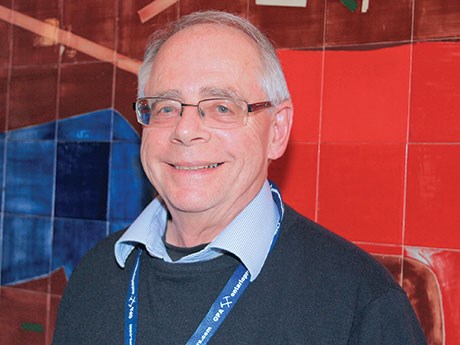To say Dave Hunt has had a long and successful career is a bit of an understatement. After graduating from Carleton University in 1969, he worked in government in the Timmins Resident Geologist Office, in industry with Dome Exploration (Canada) Limited and Placer Dome after their amalgamation, and then opened his own consultancy business in 1998 called Sharpstone Geoservices Ltd. There, he worked with companies such as Goldcorp, Corona Gold, Harte Gold, and Kodiak Exploration.
Hunt was also very involved in professional associations. He recently resigned as a director on the Ontario Prospectors Association (OPA) board, where he also had stints as treasurer and vice-president. He was president of the Northwestern Ontario Prospectors Association for three years, president of the Association of Professional Geoscientists of Ontario (APGO) in 2014, and a director of the Ontario Exploration Corporation.
Hunt was awarded the 2018 Ontario Prospectors Association (OPA) Prospector of the Year Award during the 2018 Ontario Prospectors Exploration Showcase in Thunder Bay April 3 to 5. OPA executive director Garry Clark said he was given the nod because of his support for exploration and his own professional success.
“He has devoted a lot of time to prospectors and exploration on the political side also,” Clark said. “It’s in recognition of his volunteer time as well as his professional time in the industry.”
Hunt said the OPA’s Exploration Showcase is a better forum for the small prospector than larger events such as the Prospectors & Developers Association of Canada (PDAC) annual conference in March.
“There’s a lot of networking going on here. This is a great venue for prospectors promoting their properties to junior companies and some senior companies too. The PDAC is pretty big now, so it’s a lot harder for the smaller prospector to have his voice heard down there.”
This year’s theme was “Grassroots Projects Leading to New Mines!” The exclamation point reflects some optimism in the industry after the many difficult years that prospectors and juniors have faced.
“People seem to be fairly upbeat. There are still people who can’t find work, but it’s coming back. A lot of the students are getting jobs, which is a good sign,” Hunt said.
Hunt played a role in the Junior Exploration Assistance Program (JEAP) designed to spur work in the field. Until the end of January 2018, he evaluated applications, monitored projects, and evaluated final reports. He said the program was effective inreaching its goals.
“It encouraged quite a bit of work to be done that probably wouldn’t have been done otherwise. It was geared towards really small companies that have the hardest time getting financed,” he said. “A few of the companies that applied for the second round had applied in the first round, so they were continuing the work they were doing.”
Over the years, Hunt has seen a lot of changes in the industry. He said that technology has certainly helped speed up work in the industry: drilling has become more efficient, access to the bush is easier with ATVs, and of course GPS has helped in many ways. Computers have had the biggest impact, he said, right down to taking field notes.
“Everything used to be done by hand. Now, you can log drill core in the bush with a computer, and have a finished record within half an hour of when the drillhole’s done,” he said.
On the other hand, increased regulation around plans and permitting slows down the process and increases costs, he said.
Another big disruptor to prospecting is online claim staking. It makes it less expensive for companies, he said, but it will negatively affect prospectors who supplement their income by staking.
“The other thing it means is that fewer people are going to be on the ground, looking at the rocks and discovering things by happenstance when they’re walking through the bush. You don’t see that when you’re behind a computer. That’s a potential loss unless companies hire prospectors to go out into the bush afterwards.”
Hunt said that from his perspective, the best results come when geologists and prospectors are working together. “The combination of the two works really well... It’s certainly more successful than one or the other.” The fact that companies receive double assessment credits for hiring prospectors helps, too.
Hunt said he is pretty much retired from the business now, and plans to move down to the London area in summer 2018 so that he and his wife can be closer to her family.



.jpg;w=120;h=80;mode=crop)